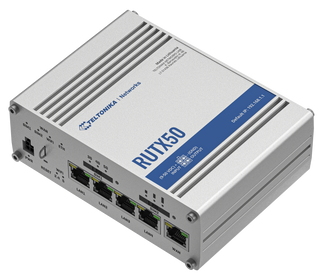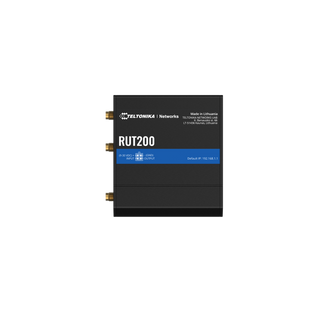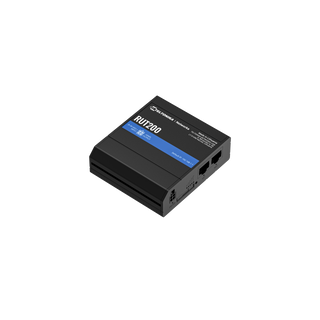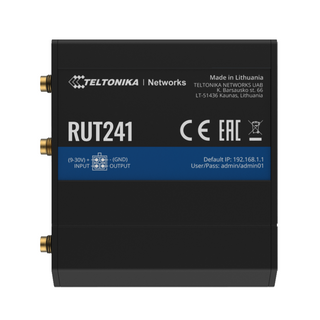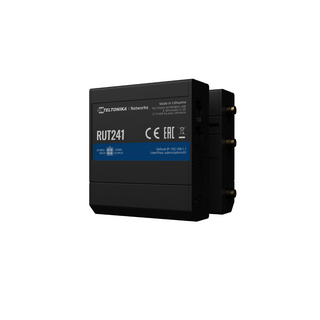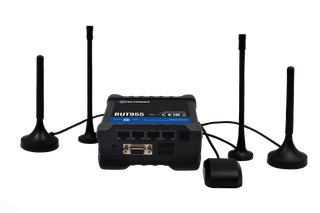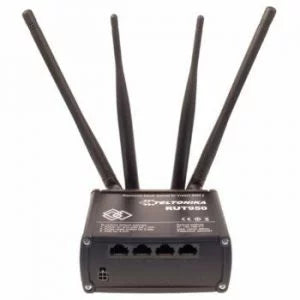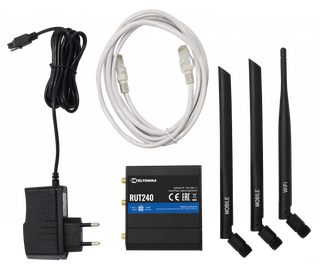What is 3G 4G Router?
3G and 4G routers are devices that provide internet connection from 3G or 4G cellular networks. These routers can turn the cellular network into a Wi-Fi network or a wired network via Ethernet. In short, using a 3G or 4G router, you can connect to the internet via a SIM card obtained from the mobile network provider.
These types of routers are generally used in places where there is mobility or where there are no fixed internet connection options such as DSL / Cable. For example, portable offices, mobile workstations, rural areas or vehicles frequently use these types of network & modem devices .
3G Routers
3G routers use 3G cellular networks. 3G is a mobile network technology first introduced in 1998 and typically offers download speeds in the Mbps range. 3G routers generally operate at slower speeds, so they may be better suited for simple tasks or situations requiring low data usage.
4G Routers
4G routers use 4G LTE (Long-Term Evolution) cellular networks and offer much faster download/upload speeds than 3G, often up to 100 Mbps or higher. 4G routers can seamlessly support video streaming, high-quality VoIP, complex web applications and much more.
Both types of routers usually come with one or more Ethernet ports, Wi-Fi capabilities, and various security features (VPN support, firewall, etc.). However, 4G routers generally offer higher speeds and more features than 3G routers.
4.5G Routers
4.5G is often considered an evolution of 4G and is also known as LTE-Advanced Pro (LTE-A Pro). This technology pushes the boundaries of 4G LTE and delivers high data speeds, low latencies, and greater capacity. Therefore, 4.5G routers are generally more suitable for high-performance internet requirements.
4.5G routers connect to the cellular network via a SIM card and share this connection with other devices over Wi-Fi or Ethernet. These are devices well-suited for data-intensive applications such as video conferencing, HD video streaming and large file transfers.
4.5G Router Features:
- Fast Speeds: 4.5G technology can deliver download speeds of up to 1 Gbps. However, in real-world conditions these speeds are often slightly lower.
- Low Latency : 4.5G comes with faster data transmission and lower latency. This is good for applications that require low latency, such as online gaming and VoIP.
- Multiple Device Support: 4.5G routers often have multiple Wi-Fi bands so that more devices can connect simultaneously.
- Security Features: It comes with a number of security features such as VPN support, firewall, and MAC address filtering.
- Wired Connections: Most 4.5G routers offer one or more Ethernet ports, allowing wired devices to easily connect as well.
4.5G routers are very useful in places where a stable internet connection is not available, such as busy offices, yachts, caravans or rural areas. However, they can also be an effective solution in home or office environments with high data speeds and performance requirements.
What are the Router Types?
Routers are divided into various categories according to their usage areas, capabilities and technologies. Here are some common router types:
Home Routers
These routers are generally designed for home users and offer wireless Wi-Fi connectivity. They usually have simple installations and user-friendly interfaces.
Business Routers
These types of routers are designed to support more users and complex network configurations. Features such as advanced security features, VPN support and QoS (Quality of Service) are frequently found in these routers.
Multi-Band Routers
These routers can operate on multiple frequency bands, usually 2.4 GHz and 5 GHz. Multi-band routers can create multiple Wi-Fi networks to manage network traffic more effectively.
Modem Router Combinations
These devices combine a DSL or cable modem and a Wi-Fi router in one box. They can perform both modem and router duties.
3G/4G/4.5G Routers
These routers can connect to a cellular network and share that connection via Wi-Fi or Ethernet.
Travel Routers
These small, portable routers usually run on USB power and are designed to be used while traveling.
VPN Routers
These types of routers provide VPN connections for all devices on the local network. This is useful for secure and anonymous internet access.
Gaming Routers
These routers are designed to optimize the online gaming experience by providing low latency and high speeds.
Wireless Mesh Routers
These routers are designed to cover large areas, usually using one main router and several satellite devices. These systems provide a more even distribution of the Wi-Fi signal throughout the home or workplace.
Virtualized Routers
These routers are often used in large-scale networks and data centers. They can run on virtual machines and provide network functionality without relying on hardware.
Each type of router may be better suited for certain needs and usage scenarios, so choosing the right type is important.
Which is the Most Powerful Router?
The definition of "most powerful router" may vary depending on your needs and usage scenario. However, determining whether a router is "strong" is often determined by considering factors such as high-speed connections, wide coverage, security features, and customizability.
Manufacturers usually release new models every year, so the most powerful model available may change over time. However, across brands, manufacturers such as ASUS, Netgear, TP-Link and Google generally produce high-performance routers.
Examples of Powerful Routers According to Their Features:
- High Speed: Generally, routers that support Wi-Fi 6 or Wi-Fi 6E can reach speeds of 1 Gbps and above.
- Multi-Band Supports: Multi-band (tri-band or more) routers can provide high performance to more devices.
- Wide Coverage Area: Mesh Wi-Fi systems or routers with a high number of antennas can offer wide coverage.
- Advanced Security Features: Security features such as firewall, VPN support, WPA3 encryption are among the factors that determine whether a router is strong or not.
- Advanced Management Features: Features such as QoS, parental controls, guest networking are also clues as to whether a router is powerful or not.
These are just general examples and may be some of the criteria you should consider to choose a model that suits your needs. You may often have to pay a high price for a powerful router, but it is possible to find a model that suits your budget and needs.
How Much Are Router Prices?
Router prices may vary depending on many factors. The product's brand, model, supported technology, additional features and even the geographical location where it was purchased can affect pricing. However, to give you a general idea, here are the price ranges by some basic categories. Please note that these prices are only an indication and it is best to visit retail sites or stores for current and exact prices.
WLAN Router (Wi-Fi Router)
- Entry Level: $20-$50. Covers models with basic Wi-Fi 5 (802.11ac) or older standards.
- Mid-Range: $50-$150. Usually dual-band, sometimes tri-band, has better coverage and speed capability. It can support Wi-Fi 6.
- High-End: $150-$400 or more. Fast speeds, wide coverage, advanced security features, and customizability generally fall into this category. It can support Wi-Fi 6 or Wi-Fi 6E.
4G LTE Supported Router
- Entry Level: $50-$100. It offers basic 4G speeds and limited additional features.
- Mid-Range: $100-$200. It offers better speed capability, mostly dual-band Wi-Fi, and basic security features.
- High-End: $200-$500 or more. It offers fast 4G or 4.5G speeds, tri-band or better Wi-Fi, and advanced security and management features.
These price ranges are a general guide and may vary depending on the features, brand or model of the products. It is most reliable to visit retailers' websites or stores for up-to-date price and model information.
What Does Gateway Do?
A gateway essentially acts as a bridge or “choice point” between different networks or network segments. It acts as a type of "translator" to accurately transmit data packets between two different network protocols or communication architectures. For example, it provides communication between a local area network (LAN) and the internet. The main areas where gateways come in handy are:
Data Communication
It enables data transmission between different networks or protocols. For example, it can facilitate data transmission between a TCP/IP network and a Novell NetWare network.
Security
It monitors network traffic and checks whether it complies with certain security policies. For example, a firewall can act as a type of gateway to filter network traffic.
Protocol Conversion
It translates different network protocols into each other. This ensures that old and new systems or different types of systems can interoperate.
Data Filtering and Transformation
It can examine data packets and convert them to a specific format or protocol. For example, a VoIP gateway can convert analog voice signals into digital data.
Application Access
It facilitates data transmission between different applications or services. For example, an API gateway can manage communication between various microservices.
Concurrent Transactions
In applications requiring real-time or high-speed data transmission, gateways can accelerate data flow and support concurrent operations.
Local and Remote Management
Some gateways allow network administrators to manage remote networks as well as the local network.
These functions may vary depending on the different types of gateways and the specific scenarios in which they are used. But in general, the main function of a gateway is to provide compatible and effective data communication between different networks or systems .
What are the Gateway Types?
A gateway is a network device used to connect different network protocols or communication architectures. It works as a kind of "translator" or "interconnector". Gateways enable the flow of data packets, often between different types of networks or protocols. Here are some common gateway types:
Network Gateways
Network gateways are one of the most common types of gateways and connect two different networks. Modem-router combinations generally used to connect to the Internet at home fall into this category.
VoIP Gateways
These types of gateways provide telephone service over the Internet. They convert analog signals into digital signals or IP packets.
SMS Gateways
These gateways translate short message service (SMS) into another form of communication (for example, email) or act as a bridge between such services.
Email Gateways
It is used to manage e-mail traffic and perform security filtering. They may offer features such as spam filtering and virus scanning.
API Gateways
Such gateways process API requests and communicate with the appropriate services. This is especially common in microservices architectures.
IoT Gateways
These gateways enable Internet of Things (IoT) devices to connect to the Internet or other networks. Generally, they provide data processing and security for such devices.
Cloud Gateways
These gateways enable local networks and cloud services to communicate securely and efficiently. They usually have the capacity to encrypt data and manage traffic.
Payment Gateways
These types of gateways are used to process online payment transactions. It processes credit card information and communicates securely with financial institutions.
Data Gateways
These gateways often act as a bridge between big data and analytics platforms, translating different data formats and protocols into each other.
Each type of gateway is designed to solve a specific communication problem or manage a specific type of data traffic. Therefore, which gateway type to use may vary depending on the requirements and use case.
Industrial gateways are used in industrial environments such as factories, energy production facilities, transportation systems. These types of gateways are usually designed to withstand harsh environmental conditions, high temperatures, moisture or dust. Additionally, these gateways are often compatible with proprietary industrial protocols and standards. Here are some of its features:
What are the Features of Industrial Gateway?
- Robust Design: They have a structure that can withstand harsh industrial conditions.
- Multi-Protocol Support: They support industrial protocols such as Modbus, Profibus, EtherCAT.
- Security: Since industrial systems are often critical, such gateways have high security standards.
- Real-Time Processing: Industrial applications often require real-time data processing. Such gateways are generally capable of meeting this need.
- Data Integration: There is the ability to combine data from different sources and transmit it in the appropriate format.
- Remote Access and Management: Industrial gateways often offer remote access and management features, allowing systems to be monitored and controlled more effectively.
Industrial Gateway Types by Type
- PLC Gateways: Used to communicate with Programmable Logic Controllers (PLC).
- Sensor Gateways: Used to collect and process data from various sensors.
- HMI Gateways: Used for communication with Human-Machine Interface (HMI) systems.
- Data Collection and Distribution Gateways: Often used in large data collection and analysis applications.
- IIoT Gateways: Used for Industrial Internet of Things (IIoT) devices.
- Communication Gateways: Connects different industrial network protocols.
Industrial gateways are designed to take into account the complexity and diversity of industrial automation and control systems. They can often be costly, but the functionality and reliability they provide can justify the cost.
< Kısalt
What is 3G 4G Router?
3G and 4G routers are devices that provide internet connection from 3G or 4G cellular networks. These routers can turn the cell... Devamını Gör >
You’re viewing 1-15 of 15 products


